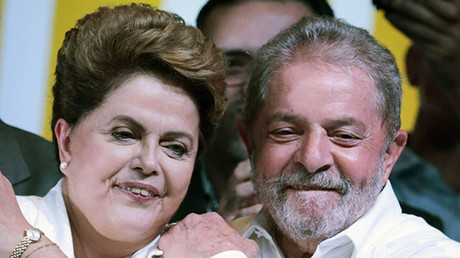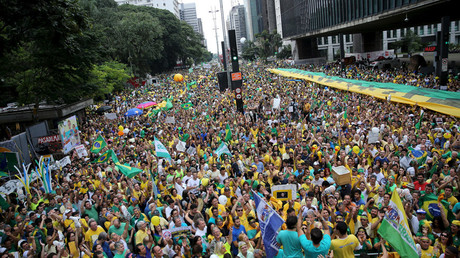Color revolutions would never be enough; Exceptionalistan is always on the lookout for major strategic upgrades capable of ensuring perpetual Empire of Chaos hegemony.
The ideological matrix and the modus operandi of color revolutions by now are a matter of public domain. Not so much the concept of Unconventional War (UW).
UW was spelled out by the 2010 Special Forces Unconventional Warfare manual. Here's the money quote:
"The intent of US [Unconventional Warfare] UW efforts is to exploit a hostile power's political, military, economic, and psychological vulnerabilities by developing and sustaining resistance forces to accomplish US strategic objectives… For the foreseeable future, US forces will predominantly engage in irregular warfare (IW) operations.""Hostile" powers are meant not only in a military sense; any state that dares to defy any significant plank of the Washington-centric world "order" – from Sudan to Argentina – may be branded "hostile".
This U.S. Navy handout image shows Baker, the second of the two atomic bomb tests, in which a 63-kiloton warhead was exploded 90 feet under water as part of Operation Crossroads, conducted at Bikini Atoll in July 1946 to measure nuclear weapon effects on warships. U.S. Navy A world war has begun. Break the silence – John Pilger
The dangerous liaisons between color revolutions and UW have now fully blossomed as Hybrid War; a warped case of Flowers of Evil. A color revolution is nothing but the first stage of what will become Hybrid War. And Hybrid War can be interpreted essentially as the weaponization of chaos theory – an absolute conceptual darling of the US military ("politics is the continuation of war by linguistic means"). My 2014 book Empire of Chaos essentially tracks its myriad manifestations.
This very well-argued three-part thesis clarifies the central objective behind a major Hybrid War; "to disrupt multipolar transnational connective projects through externally provoked identity conflicts (ethnic, religious, political, etc.) within a targeted transit state."
The BRICS – an extremely dirty word/concept in the Beltway/Wall Street axis – had to be the prime targets of Hybrid War. For myriad reasons. Among them; the push for trade and commerce in their own currencies, bypassing the US dollar; the creation of the BRICS development bank; the avowed drive towards Eurasia integration, symbolized by the now converging China-led New Silk Roads - or One Belt, One Road (OBOR), in its official terminology - and Russia-led Eurasia Economic Union (EEU).
This implies that Hybrid War sooner rather than later will hit Central Asia; Kyrgysztan, a prime lab for Exceptionalistan experiments of the color revolution kind, is the ideal candidate.
As it stands, Hybrid War is very much active in Russia's western borderlands (Ukraine) but still embryonic in Xinjiang, China’s Far West, which Beijing micromanages like a hawk. Hybrid War is already being applied to prevent a crucial Pipelineistan gambit; the construction of Turkish Stream. And will also be fully applied to interrupt the Balkan Silk Road – essential for China’s integrated trade/commerce with Eastern Europe.
Paulo Whitaker Brazil's revolution starting to reveal its true colors
As the BRICS are the only, real counter power to Exceptionalistan, a strategy had to be developed for each of the major players. Everything was thrown at Russia – from sanctions to full demonization, from a raid on its currency to an oil price war, even including (pathetic) attempts to start a color revolution in the streets of Moscow. For a weaker BRICS node, a more subtle strategy would have to be developed. Which brings us to the complexity of Hybrid War as applied to the current, massive political/economic destabilization of Brazil.
In the UW manual, swaying the perceptions of a vast "uncommitted middle population" is essential in the road to success, so these uncommitted eventually turn against their political leaders. The process encompasses everything from "supporting insurgency" (as in Syria) to "wider discontent through propaganda and political and psychological efforts to discredit the government" (as in Brazil). And as an insurrection escalates, so should the "intensification of propaganda; psychological preparation of the population for rebellion." That, in a nutshell, has been the Brazilian case.
We need our own Saddam
Exceptionalistan's utmost strategic objective is usually to have a merger of color revolution and UW. But Brazil's civil society and vibrant democracy were too sophisticated for hardcore UW steps such as sanctions or R2P ("responsibility to protect").
It's no wonder that Sao Paulo was turned into the epicenter of the Hybrid War against Brazil. Sao Paulo, the wealthiest Brazilian state, also housing the economic/financial capital of Latin America, is the key node in an interlinked national/international power structure.
The Wall Street-centered global financial system – which rules over virtually the whole West – simply could not allow national sovereignty in full expression in a major regional actor such as Brazil.
The Brazilian Spring, in the beginning, was virtually invisible, an exclusive social media phenomenon – just as Syria in early 2011.
Then, in June 2013, Edward Snowden leaked those notorious NSA spying practices. In Brazil, the NSA was all over Petrobras. And suddenly, out of the blue, a regional judge, Sergio Moro, based on a single source - a currency exchange operator in the black market – had access to a major Petrobras document dump. Up to now, the two-year Car Wash corruption investigation has not revealed how they got to know so much about what they dub the "criminal cell" acting inside Petrobras.
Former president Luiz Inacio Lula da Silva and Brazilian President Dilma Rousseff. © Reuters 'Prime Minister' Lula: The Brazilian game-changer
What matters is that the color revolution modus operandi – a fight against corruption and "in defense of democracy" - was already in place. That was the first step of Hybrid War.
As Exceptionalistan coined "good" and "bad" terrorists wreaking havoc across "Syraq", in Brazil surged the figure of the "good" and the "bad" corrupt.
Wikileaks also unveiled how Exceptionalistan doubted Brazil could design a nuclear submarine – a matter of national security. How construction company Odebrecht was going global. How Petrobras by itself developed the technology to explore the pre-salt deposits – the largest oil discovery of the young 21st century, of which Big Oil was excluded by none other than Lula.
Then, as a result of Snowden's revelations, the Rousseff administration required all government agencies to use state-owned companies for their technology services. This would mean that US companies could lose as much as $35 billion in revenue over two years as they would be deprived of business in the 7th largest economy in the world – as research group Information Technology & Innovation Foundation discovered.
The future is happening now
The march towards Hybrid War in Brazil had little do to with the political left or right. It was basically about mobilizing a few wealthy families that actually run the country; buy large swathes of Congress; control mainstream media; behave like 19th century slave plantation owners (slavery still permeates all social relations in Brazil); and legitimize it all via a hefty, yet bogus, intellectual tradition.
They would give the signal for the mobilization of the middle class.
Sociologist Jesse de Souza identified a Freudian "substitutive gratification" phenomenon under which the Brazilian middle class – with large swathes now clamoring for regime change - imitates the wealthy few as much as it’s ruthlessly exploited by them, via mountains of taxes and sky-high interest rates.
The wealthy 0,0001% and the middle classes needed an Other to demonize – Exceptionalistan style. And what could be more perfect for the judicial-police-media-old comprador elite complex than the figure of a tropical Saddam Hussein: former President Lula.
Ultra right-wing "movements" financed by the nefarious Koch Brothers suddenly popped up on social networks and street protests. The Brazilian attorney general visited the Empire of Chaos leading a Car Wash team to hand out Petrobras information that could prop up possible Department of Justice indictments.
Demonstrators attend a protest against Brazil's President Dilma Rousseff, part of nationwide protests calling for her impeachment, in Sao Paulo, Brazil, March 13, 2016. © Nacho Doce 3mn people take to streets in Brazil's biggest ever anti-govt protest
Car Wash and the – immensely corrupt - Brazilian Congress, which will now deliberate over the possible impeachment of President Rousseff, revealed themselves as indistinguishable.
By then, the scriptwriters were sure that a regime change social infrastructure was already built into a critical anti-government mass, thus allowing the color revolution's full bloom. The way to a soft coup was paved – without even having to resort to lethal urban terrorism (as in Ukraine). The problem was that if the soft coup failed – as it now seems at least possible – it would be very hard to unleash a hard coup, Pinochet-style, via UW, against the beleaguered Rousseff administration; that is, finally accomplishing Full Hybrid War.
On a socioeconomic level, Car Wash would only be fully "successful" if mirrored by a softening up of Brazilian laws regulating oil exploration, opening it up for US Big Oil. And in parallel, all social spending programs would have to be smashed.
Instead, what’s happening now is the progressive mobilization of Brazilian civil society against a white coup/soft coup/regime change scenario. Crucial actors in Brazilian society are now firmly positioned against the impeachment of President Rousseff, from the Catholic church to evangelicals; first tier university professors; at least 15 state governors; masses of union workers and "informal economy" workers; artists; leading intellectuals; jurists; the overwhelming majority of lawyers; and last but not least, the "deep Brazil" that legally elected Rousseff with 54.5 million votes.
It ain't over till some fat man in the Brazilian Supreme Court sings. What's certain is that independent Brazilian academics are already laying down the theoretical bases to study Car Wash not as a mere, massive anti-corruption drive; but as the ultimate case study of Exceptionalistan's geopolitical strategy applied to a sophisticated globalized environment dominated by infotech and social networks. The whole developing world should be fully alert – and learn the relevant lessons, as Brazil is bound to be analyzed as the ultimate case of Soft Hybrid War.
Pepe Escobar is an independent geopolitical analyst. He writes for RT, Sputnik and TomDispatch, and is a frequent contributor to websites and radio and TV shows ranging from the US to East Asia. He is the former roving correspondent for Asia Times Online. Born in Brazil, he's been a foreign correspondent since 1985, and has lived in London, Paris, Milan, Los Angeles, Washington, Bangkok and Hong Kong. Even before 9/11 he specialized in covering the arc from the Middle East to Central and East Asia, with an emphasis on Big Power geopolitics and energy wars. He is the author of "Globalistan" (2007), "Red Zone Blues" (2007), "Obama does Globalistan" (2009) and "Empire of Chaos" (2014), all published by Nimble Books. His latest book is "2030", also by Nimble Books, out in December 2015.
________
Further reading:
Prosecuting Unending "Limited" Wars - Military-Industrial Complex Metastasized into the 51st State - America is a Military With a State Attached - There are Two Department of "Defenses": DoD and DHS - The New Jesuit Priests: U.S. Special Operations Command - Accountability and Lines of Responsibility Destroyed - Corporate Generals Cashing-In - American People Completely Disenfranchised - Law of Hybrid Warfare - Societal and Structural Preconditioning - We've Hit "Rubicon" on Taking Back Our Civilization





No comments:
Post a Comment
Note: Only a member of this blog may post a comment.